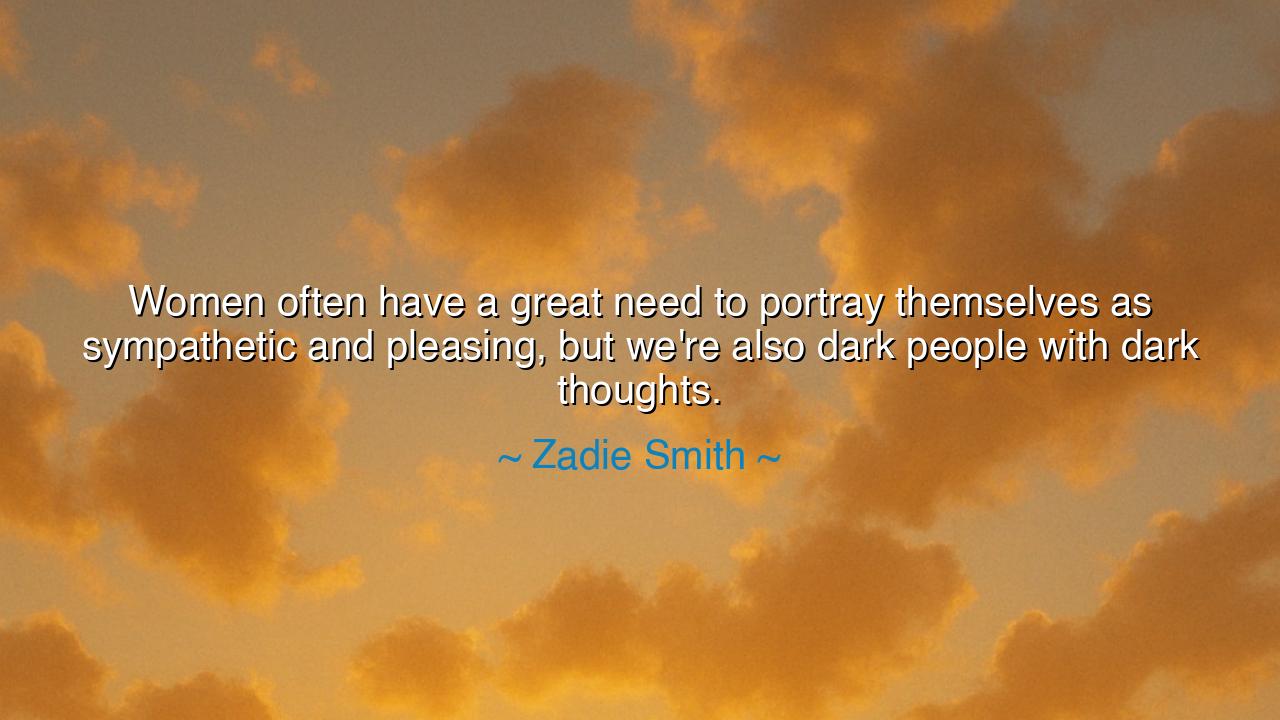
Women often have a great need to portray themselves as
Women often have a great need to portray themselves as sympathetic and pleasing, but we're also dark people with dark thoughts.






“Women often have a great need to portray themselves as sympathetic and pleasing, but we’re also dark people with dark thoughts.” — Zadie Smith
In the voice of Zadie Smith, there resounds a timeless truth about the dual nature of the human soul—and in particular, the hidden depths of womanhood. Her words cut through the polished masks society has demanded for centuries, revealing the shadow beneath the smile, the storm beneath the calm. When she says that women have a need to be “sympathetic and pleasing,” she speaks of the ancient expectation placed upon them: to be gentle, to soothe, to charm, to carry the emotional burdens of the world with grace. But when she adds that women are also “dark people with dark thoughts,” she dares to speak the truth forbidden in many ages—that women, too, are fierce, complex, and filled with unspoken fire.
The ancients knew of the duality of nature—light and shadow, day and night, creation and destruction. Yet how often has the world allowed men to embody both, while demanding from women only the light? In every age, the feminine has been adorned in purity and submission, while her inner world—her anger, her ambition, her raw power—was exiled to silence. Zadie Smith’s words awaken that hidden self and call it home. She reminds us that darkness is not evil, but depth; that to have “dark thoughts” is to possess honesty, imagination, and the courage to feel fully.
Consider Medea, from the tragedies of ancient Greece. For centuries, her name has been whispered with fear—she who defied betrayal and committed the unspeakable. Yet beneath her rage lies a reflection of a deeper truth: the world that silences women’s pain often drives it inward until it burns. Medea’s story, though extreme, is not about cruelty—it is about suppression, about what happens when the fullness of a woman’s being is denied. Through her, we glimpse the consequence of denying women their shadow. Zadie Smith’s insight is a gentler, wiser echo of this same lesson: that to be whole, a woman must acknowledge both her light and her darkness.
In Smith’s own life and writing, we see this truth unfold. As an author, she gives voice to the contradictions of modern identity—joy and despair, beauty and bitterness, tenderness and truth. She understands that art is not born from perfection, but from the union of opposites. Her statement is not an act of rebellion for rebellion’s sake, but a restoration of balance. For if women must always appear pleasing, they become strangers to themselves; if they can only smile, they lose the right to roar.
This wisdom reaches beyond gender—it is the human condition itself. Every soul contains its shadow self, the part we fear to reveal. Yet it is from this darkness that empathy and strength arise. Those who deny their shadow become brittle and false; those who embrace it become authentic and wise. To admit our darkness is to be courageous enough to say: I am not perfect, but I am real. This is what Zadie Smith asks of women—and of all people—that they claim the fullness of their nature, even when it defies the world’s expectations.
So, let this be your teaching, O seeker of truth: do not live only in the light, lest you become shallow; do not dwell only in darkness, lest you be consumed. Instead, let the two meet within you. Be kind, yes—but also be honest. Be loving, but let your fire be known. Speak the thoughts you are told to hide; let them breathe and take shape. For from that union of compassion and candor, grace and gravity, the truest strength is born.
To every woman who has ever softened her words, dimmed her power, or concealed her storm—hear this ancient wisdom reborn through Smith’s voice: your darkness is not your shame; it is your depth. Within it lies creativity, insight, and the truth that makes art, love, and life worth living. The world does not need women who only please—it needs women who are whole.
And so, embrace your full being, as night embraces the stars. For it is only when we honor both our gentleness and our darkness that we become fully alive—creatures of complexity, carriers of truth, and keepers of that most sacred of powers: the courage to be seen as we truly are.






AAdministratorAdministrator
Welcome, honored guests. Please leave a comment, we will respond soon